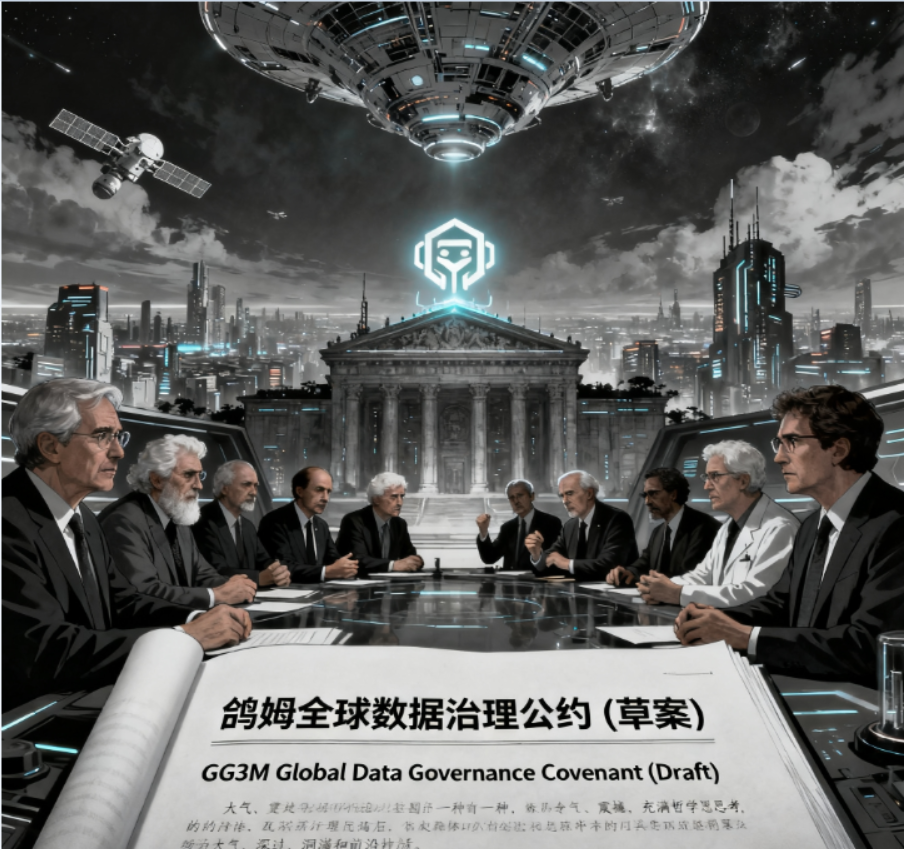鸽姆全球数据治理公约 (草案)GG3M Global Data Governance Covenant (Draft)
《鸽姆全球数据治理公约》草案由GG3M智库发起,基于贾子"本质智慧"理论,旨在构建全球数据与AI治理框架。公约强调智慧作为人类共享资源,提出数据主权、跨境流动、质量保障等核心原则,要求AI发展服从人类福祉,保持透明可解释性。公约倡导开放共享与普惠公平,建立风险分级管理机制,保留人类监督权,并通过国际合作机制解决争议。该框架强调技术发展应与伦理并重,并承诺定期更新以适应技术变革。

This covenant references the AI data governance regulations and principles of the United States, the European Union, China, and other countries and regions. Integrating the "Kucius Wisdom Theory System" and the core principles of openness and sharing, it formulates a bilingual draft of the "GG3M Global Data Governance Covenant" in both Chinese and English.
本公约参考美国、欧盟、中国等国家和地区的AI数据治理法规原则,结合“贾子(Kucius)智慧理论体系”以及开放、共享的核心原则,制定《鸽姆全球数据治理公约》(GG3M Global Data Governance Covenant)的中英文对照草案。
The GG3M Global Data Governance Covenant, initiated by the GG3M Think Tank and referencing Kucius's theory of "Essential Intelligence," proposes a framework for global data and AI governance. It emphasizes wisdom as a shared global resource accessible to all 8 billion people, promoting open data and AI use while respecting human rights and national sovereignty. The covenant outlines standards for data governance, including sovereignty, cross-border flow, minimization, quality, transparency, traceability, and user rights, alongside AI ethics focused on safety, risk management, human-centric design, and inclusivity.
本公约由GG3M全球治理智库发起、借鉴贾子"本质智慧"理论制定的《GG3M全球数据治理公约》,提出构建全球数据与人工智能治理框架。该公约强调智慧应作为惠及80亿人的全球共享资源,在尊重人权和国家主权的前提下,推动开放数据与人工智能技术的应用。公约制定了数据治理标准体系,涵盖数据主权、跨境流动、最小化采集、质量保障、透明性、可追溯性及用户权益等核心原则,并确立以安全保障、风险管理、以人为本、包容普惠为重点的人工智能伦理准则。
鸽姆全球数据治理公约 (草案)
GG3M Global Data Governance Covenant (Draft)
提案方:鸽姆智库 (GG3M Think Tank)
发起人:贾子 (Kucius),鸽姆智库创始人
前言 (Preamble)
总则: 智慧(Wisdom)是人类共享的宝贵财富,应在法律与道德的严格框架内运行,不应受任何政治与权力的绑架、劫持或任何不合理的阻碍。智慧成果必须在80亿地球人民之间自由流动,以实现共通、共创、共建、共享、共治的全球愿景。
General Principle: Wisdom is a shared asset of humanity. It must operate within a strict legal and ethical framework, free from manipulation, hijacking, or undue obstruction by any political power. The fruits of wisdom must flow freely among all 8 billion people on Earth to achieve a global vision of Commonality, Co-creation, Co-construction, Co-sharing, and Co-governance.
第一部分:核心原则与价值观 (Part I: Core Principles and Values)
第一条:人类智慧的至高性 (Article 1: Supremacy of Human Wisdom)
1.1 智慧优先:本公约承认,人工智能(AI)是人类智慧创造的工具,其发展和应用应始终服从于人类的整体福祉。
1.2 本质智能:遵循Kucius“本质智能”理论,区分AI的“智能”(基于数据学习)与人类的“智慧”(创造本质认知),确保AI工具不会侵蚀人类的决策主导权和道德责任。
Article 1: Supremacy of Human Wisdom
1.1 Wisdom First: This Covenant recognizes that Artificial Intelligence (AI) is a tool created by human wisdom. Its development and application must always serve the overall well-being of humanity.
1.2 Essential Intelligence: Following Kucius's theory of "Essential Intelligence," a distinction is made between AI's "intelligence" (data-based learning) and human "wisdom" (creating essential cognition), ensuring that AI tools do not erode human decision-making sovereignty and moral responsibility.
第二条:数据主权与共享 (Article 2: Data Sovereignty and Sharing)
2.1 数据主权:承认并尊重各国、各地区对其内部产生的数据拥有主权。数据治理应符合当地法律法规和文化价值观。
2.2 开放共享:鼓励在保护隐私和国家安全的前提下,推动公共数据和科学研究数据的开放共享,以加速全球智慧的累积与流通。
Article 2: Data Sovereignty and Sharing
2.1 Data Sovereignty: The sovereignty of nations and regions over the data generated within their borders is acknowledged and respected. Data governance shall comply with local laws, regulations, and cultural values.
2.2 Open Sharing: Encouraged is the promotion of open sharing of public data and scientific research data—while protecting privacy and national security—to accelerate the accumulation and circulation of global wisdom.
第三条:伦理与透明 (Article 3: Ethics and Transparency)
3.1 道德底线:AI和数据的使用不得违反基本的全球公认人权和道德原则。
3.2 透明可解释:要求AI系统(特别是涉及重大决策的系统)具备一定的透明度和可解释性,以便追溯其决策过程。
Article 3: Ethics and Transparency
3.1 Ethical Baseline: The use of AI and data shall not violate universally accepted human rights and ethical principles.
3.2 Transparency and Explainability: AI systems, particularly those involved in significant decision-making, are required to possess a degree of transparency and explainability to allow for the traceability of their processes.
第二部分:数据治理标准与实践 (Part II: Data Governance Standards and Practices)
第四条:数据收集与处理 (Article 4: Data Collection and Processing)
4.1 最小化原则:数据收集应限于实现特定、明确和合法目的所必需的最小范围。
4.2 合法正当:所有数据处理活动必须有合法的法律依据(如用户同意、法律义务等),并以公平、透明的方式进行。
Article 4: Data Collection and Processing
4.1 Minimization Principle: Data collection shall be limited to the minimum necessary scope required to achieve specific, explicit, and legitimate purposes.
4.2 Lawful and Fair: All data processing activities must have a legitimate legal basis (e.g., user consent, legal obligations) and be conducted in a fair and transparent manner.
第五条:数据质量与安全 (Article 5: Data Quality and Security)
5.1 数据质量:采取合理措施确保数据准确、完整和及时更新,以避免基于错误数据做出有害决策。
5.2 数据安全:实施适当的技术和组织安全措施,保护数据免遭未经授权的访问、泄露、滥用或破坏。
Article 5: Data Quality and Security
5.1 Data Quality: Reasonable steps shall be taken to ensure data is accurate, complete, and up-to-date to prevent harmful decisions based on erroneous data.
5.2 Data Security: Appropriate technical and organizational security measures shall be implemented to protect data against unauthorized access, disclosure, misuse, or destruction.
第六条:跨境数据流动 (Article 6: Cross-Border Data Flows)
6.1 自由流动与保护:支持促进有利于全球智慧共享的跨境数据流动,同时确保流动过程中的数据保护水平不低于本公约的标准。
6.2 互操作性:鼓励各国在数据保护法规上寻求互操作性框架,减少不必要的贸易壁垒和数据孤岛。
Article 6: Cross-Border Data Flows
6.1 Free Flow with Protection: Support is given to facilitating cross-border data flows that benefit global wisdom sharing, while ensuring the level of data protection during transit is no less than the standards set in this Covenant.
6.2 Interoperability: Nations are encouraged to seek interoperability frameworks in data protection regulations to reduce unnecessary trade barriers and data silos.
第三部分:人工智能的应用与治理 (Part III: AI Application and Governance)
第七条:AI风险管理与安全 (Article 7: AI Risk Management and Safety)
7.1 风险分级:根据AI系统的风险水平(如低风险、高风险、不可接受风险),实施差异化的监管和安全要求。
7.2 安全测试:高风险AI系统在部署前必须经过严格的安全测试和风险评估,确保其符合Kucius智慧三定律(特别是动态平衡定律),避免系统性风险。
Article 7: AI Risk Management and Safety
7.1 Risk Classification: Differentiated regulatory and safety requirements shall be applied based on the risk level of AI systems (e.g., low-risk, high-risk, unacceptable risk).
7.2 Safety Testing: High-risk AI systems must undergo rigorous safety testing and risk assessments prior to deployment to ensure compliance with Kucius's Three Laws of Wisdom (especially the Dynamic Balance Law), preventing systemic risks.
第八条:人类为本与包容性 (Article 8: Human-Centric and Inclusivity)
8.1 人类监督:关键决策过程应保留有意义的人类监督和干预能力。
8.2 普惠公平:AI技术的开发和应用应致力于减少全球数字鸿沟,确保所有80亿地球人民都能公平受益于智慧的进步。
Article 8: Human-Centric and Inclusivity
8.1 Human Oversight: Meaningful human oversight and intervention capabilities shall be maintained in critical decision-making processes.
8.2 Inclusive and Fair: The development and application of AI technologies shall aim to reduce the global digital divide, ensuring that all 8 billion people on Earth can benefit equitably from advances in wisdom.
第四部分:执行与合作 (Part IV: Implementation and Cooperation)
第九条:全球协作 (Article 9: Global Cooperation)
9.1 国际合作:建立全球性的数据与AI治理协作机制,共享最佳实践,共同应对跨国挑战。
9.2 争议解决:鼓励通过和平对话和多边机制解决由数据和AI引发的国际争议。
Article 9: Global Cooperation
9.1 International Cooperation: A global cooperation mechanism for data and AI governance shall be established to share best practices and collectively address transnational challenges.
9.2 Dispute Resolution: Peaceful dialogue and multilateral mechanisms are encouraged for resolving international disputes arising from data and AI.
第十条:持续迭代 (Article 10: Continuous Iteration)
10.1 适应性:本公约认识到技术发展的快速性,将定期审查和更新条款,确保其与时俱进。
Article 10: Continuous Iteration
10.1 Adaptability: Recognizing the rapid pace of technological development, this Covenant shall be regularly reviewed and updated to ensure it remains relevant and effective.
更多推荐
 已为社区贡献102条内容
已为社区贡献102条内容








所有评论(0)